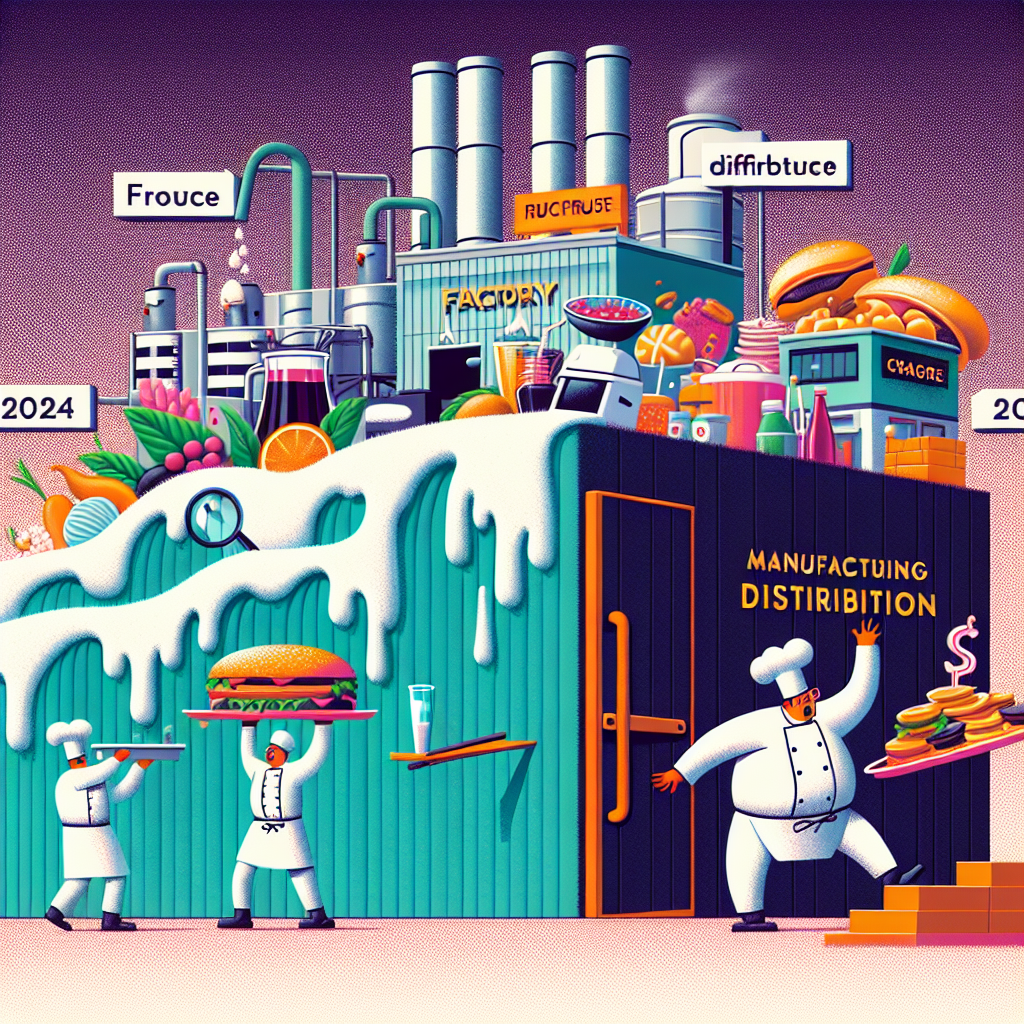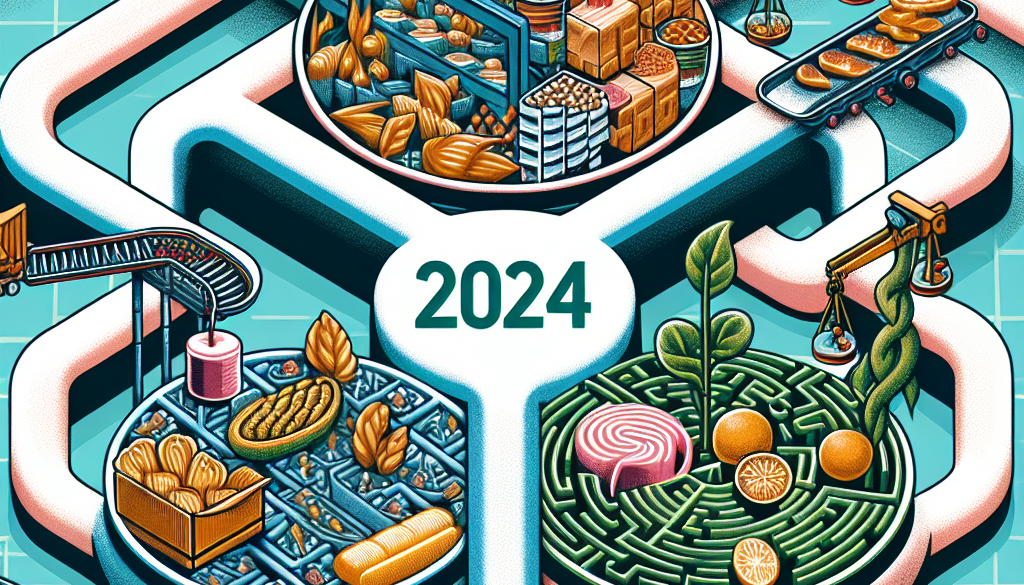Food and Beverage Industry: 3 Major Challenges 2024
-
Table of Contents
Food and Beverage Industry Challenges in 2024: A Deep Dive

The food and beverage industry is a dynamic and ever-evolving sector, facing a myriad of challenges that can impact production, distribution, and profitability. As we look towards 2024, there are several key issues that industry leaders and stakeholders must prepare for. This article will explore three major challenges that are expected to shape the landscape of the food and beverage industry in the coming year.
1. Supply Chain Disruptions and Management
One of the most pressing challenges for the food and beverage industry is the ongoing disruption of supply chains. The COVID-19 pandemic has exposed vulnerabilities in global supply networks, leading to increased scrutiny and the need for more resilient systems. In 2024, companies will continue to face:
- Raw material shortages due to climate change and geopolitical tensions.
- Transportation bottlenecks and rising logistics costs.
- Demands for greater transparency and traceability in sourcing.
Statistics from the Food and Agriculture Organization (FAO) indicate that global food prices have seen significant fluctuations, with an increase of 28% in 2021 compared to the previous year. This trend is expected to persist, prompting businesses to innovate in their supply chain management to maintain stability and reduce costs.
2. Consumer Demand for Sustainability and Health
Consumer preferences are rapidly shifting towards products that are not only healthy but also sustainable. In 2024, the food and beverage industry will need to address:
- The growing demand for plant-based and alternative protein sources.
- Increased scrutiny on packaging waste and the push for eco-friendly solutions.
- The rise of clean label products, with consumers seeking transparency in ingredients.
According to a report by Nielsen, 73% of global consumers say they would definitely or probably change their consumption habits to reduce their environmental impact. This consumer behavior is driving companies to invest in sustainable practices and product development to meet market demands.
3. Technological Advancements and Digitalization
Technology continues to revolutionize the food and beverage industry, with digitalization becoming a cornerstone for success. In 2024, companies will be challenged to integrate:
- Advanced analytics and artificial intelligence for improved decision-making.
- Blockchain for enhanced food safety and traceability.
- Automation and robotics to optimize production efficiency and reduce labor costs.
The adoption of these technologies is not without its hurdles, as businesses must invest in infrastructure and upskill their workforce to stay competitive. A study by Meticulous Research predicts that the food automation market is expected to grow at a CAGR of 9.5% from 2020 to 2027, highlighting the importance of technological investment in the industry.
Conclusion
The food and beverage industry is set to face significant challenges in 2024, with supply chain disruptions, evolving consumer demands, and technological advancements at the forefront. Companies that can adapt to these changes and implement strategic solutions will be better positioned to thrive in an increasingly competitive market. By focusing on resilience, sustainability, and innovation, industry players can navigate these challenges and capitalize on new opportunities for growth.
ETprotein: Meeting the Demand for Sustainable Protein Solutions
In response to the growing consumer demand for sustainable and healthy food options, ETprotein offers a range of high-quality protein products that cater to the needs of the food and beverage industry. Their organic bulk vegan proteins and L-(+)-Ergothioneine (EGT) are ideal for companies looking to enhance their product offerings with ingredients that are not only nutritious but also environmentally friendly.
ETprotein’s commitment to non-GMO, allergen-free, and high-purity products ensures that businesses can meet the stringent standards of today’s health-conscious consumers. With a diverse product portfolio that includes organic rice protein, clear pea protein, and various seed proteins, ETprotein is well-equipped to support the industry in overcoming the challenges of 2024 and beyond.
About ETprotein:
ETprotein, a reputable protein and L-(+)-Ergothioneine (EGT) Chinese factory manufacturer and supplier, is renowned for producing, stocking, exporting, and delivering the highest quality organic bulk vegan proteins and L-(+)-Ergothioneine. They include Organic rice protein, clear rice protein, pea protein, clear pea protein, watermelon seed protein, pumpkin seed protein, sunflower seed protein, mung bean protein, peanut protein, and L-(+)-Ergothioneine EGT Pharmaceutical grade, L-(+)-Ergothioneine EGT food grade, L-(+)-Ergothioneine EGT cosmetic grade, L-(+)-Ergothioneine EGT reference grade and L-(+)-Ergothioneine EGT standard. Their offerings, characterized by a neutral taste, non-GMO, allergen-free attributes, with L-(+)-Ergothioneine purity over 98%, 99%, cater to a diverse range of industries. They serve nutraceutical, pharmaceutical, cosmeceutical, veterinary, as well as food and beverage finished product distributors, traders, and manufacturers across Europe, USA, Canada, Australia, Thailand, Japan, Korea, Brazil, and Chile, among others.
ETprotein specialization includes exporting and delivering tailor-made protein powder and finished nutritional supplements. Their extensive product range covers sectors like Food and Beverage, Sports Nutrition, Weight Management, Dietary Supplements, Health and Wellness Products, and Infant Formula, ensuring comprehensive solutions to meet all your protein needs.
As a trusted company by leading global food and beverage brands and Fortune 500 companies, ETprotein reinforces China’s reputation in the global arena. For more information or to sample their products, please contact them and email sales(at)ETprotein.com today.












